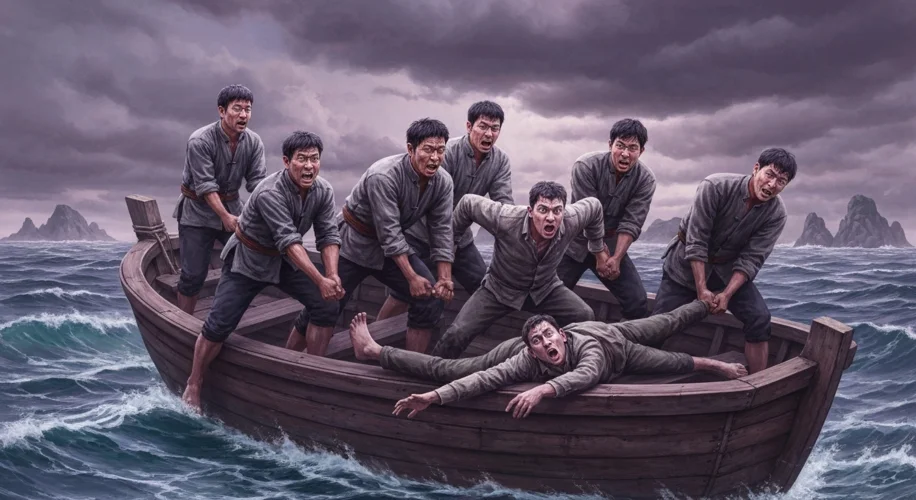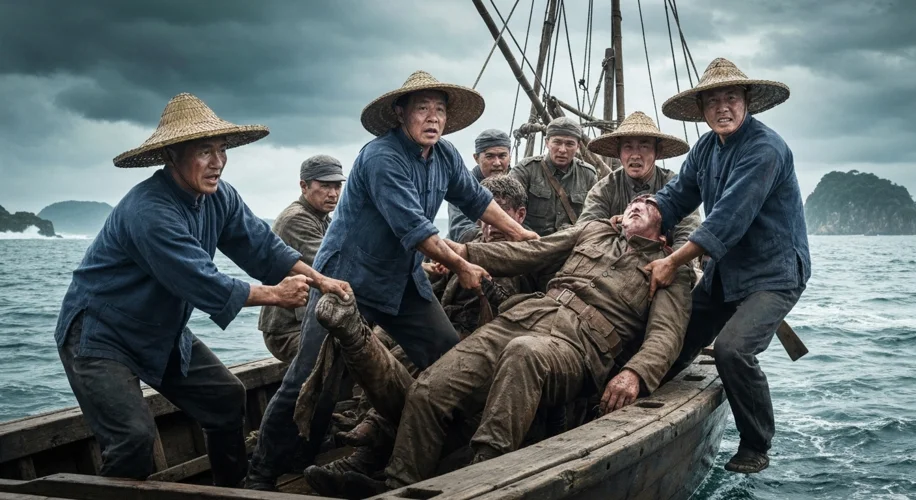The year is 1942. The world is engulfed in the inferno of World War II. On the unforgiving waters of the East China Sea, amidst the chaos and destruction, a remarkable act of human kindness unfolded, a story that too often remains adrift in the currents of history. It is the tale of the Dongji people, Chinese fishermen whose courage and compassion defied the brutal realities of war to rescue stranded British prisoners of war.
Forced marches, relentless battles, and desperate escapes marked the lives of Allied soldiers captured by the Japanese. Following the fall of Hong Kong in December 1941, thousands of British soldiers, sailors, and airmen found themselves in Japanese POW camps. However, the horrors of captivity were not the only peril. The sea, a vast and often treacherous expanse, also held dangers for those attempting to evade or escape.
In the early days of the war, as Japanese control tightened around the coasts, many Allied servicemen found themselves shipwrecked or adrift, their vessels destroyed by enemy action. Isolated, exhausted, and facing certain recapture or a watery grave, their hope dwindled with the setting sun.
It was in these desperate moments that the fishing communities of the Dongji islands, a cluster of small, rugged islands off the coast of Zhejiang province, China, emerged as beacons of hope. These were simple fisherfolk, intimately familiar with the sea’s moods and currents. Their lives were a constant struggle against the elements, yet their hearts held a deep wellspring of humanity.
When British POWs, having managed to escape the clutches of their captors or having survived shipwrecks, washed ashore or were spotted struggling in the water near their islands, the Dongji fishermen did not hesitate. Despite the immense personal risk – the Japanese military maintained a brutal presence in the region, and aiding the enemy would mean severe punishment, even death – these fishermen extended a helping hand.

These were not soldiers trained in warfare, but ordinary men and women whose bravery lay in their defiance of fear and their commitment to saving lives. They would navigate their small, sturdy fishing junks through dangerous waters, often under the cover of darkness, to reach the stranded servicemen. With no regard for their own safety, they would pull the emaciated, hypothermic soldiers aboard, offering them what little food and water they had.
The Dongji fishermen then provided clandestine sanctuary, hiding the escapees in their humble homes and among the fishing nets. They shared their meager rations, tended to their wounds with traditional remedies, and protected them from Japanese patrols. The islanders’ intimate knowledge of the terrain and their ability to blend into the local landscape proved invaluable in keeping the POWs hidden.
This was an incredibly dangerous undertaking. Japanese forces regularly patrolled the coastal waters and islands, searching for escaped prisoners and sympathizers. Discovery meant certain death for both the rescued and the rescuers. Yet, the Dongji community remained steadfast, their collective will to protect these vulnerable individuals a testament to their extraordinary moral fortitude.
One documented account speaks of a group of British servicemen who were rescued by the Dongji people after their ship was sunk. They were hidden for weeks, fed and cared for, before being guided to safety and eventual repatriation. The gratitude of these men, who had faced the abyss and been pulled back by strangers, was immeasurable.
The rescue efforts were not isolated incidents but a sustained, community-wide commitment. The Dongji people understood the risks, but they also understood the profound moral imperative to help those in dire need. Their actions were not driven by political ideology or a desire for recognition, but by a fundamental human instinct to offer aid to those suffering.
The impact of the Dongji rescue operations, though difficult to quantify precisely due to the clandestine nature of the events, undoubtedly saved numerous British lives. These men, having survived the battlefield and the prison camps, were given a second chance at life thanks to the selfless bravery of these Chinese fishermen. Their survival allowed them to eventually return to their families and contribute to the war effort in other capacities.
This story is a powerful reminder that even in the darkest hours of conflict, humanity can prevail. The Dongji fishermen, often overlooked in the grand narratives of World War II, represent the best of us. They acted not out of obligation, but out of pure, unadulterated compassion. Their legacy is etched not in stone monuments, but in the lives they saved and the enduring testament to the power of human solidarity across borders and cultures.
Their courage serves as a poignant counterpoint to the widespread devastation of the war, showcasing that acts of profound bravery and humanitarianism can bloom in the most unexpected places and from the most ordinary of people. The Dongji community’s quiet heroism deserves to be remembered, a vital chapter in the story of wartime resilience and compassion.

